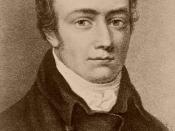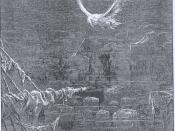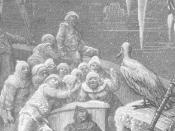The Metaphor equating the poet with an alienated traveller finds its basis both in unawareness of the effects travel may have on an individual's psychology and in the picture of the believer as an alien travelling homeward in the Bible and religious writings (cf. I Peter; 2,11). The poet like the believer is conscious of a fundamental divide between the physical world and a transcendent reality beyond it. Baudelaire's concept of the duality between ''Spleen'' and ''Ideal'' is greatly influenced by the concept of the duality between the flesh and the spirit in religious thought (cf. 2 Corinthians; 4,16,5,10). Fundamentally the same duality underlies ancient mythical accounts of demigods wandering the earth. In The Epic of Gilgamesh the exact proportions of the hero's divine and human constituency are given.
O Gilgamesh, lord of Kullab, great is thy praise. This was the man to whom all things were known; this was king who knew all countries of the world.
He was wise, he saw mysteries and knew secret things, he brought us a tale of the days before the flood. He went on a long journey, was weary, worn-out with labour, and returning engraved on a stone the whole story. When the gods created Gilgamesh they gave him a perfect body. Shamash the glorious sun endowed him with beauty, Adad the god of the storm endowed him with courage, the great gods made his beauty perfect, surpassing all others. Two thirds they made him god and one-third man. 4
"The Ancient Mariner" incorporates aspects and characteristics of the archetypal wanderers of antiquity. Like them he is subject to the overriding influence of higher powers often identified as the planets in the original sense of the word (the seven wanderers - the sun, the moon, Mars, Mercury, Jupiter, Venus, Saturn). The movements...



Good
good written essay with no plagiarism
0 out of 0 people found this comment useful.